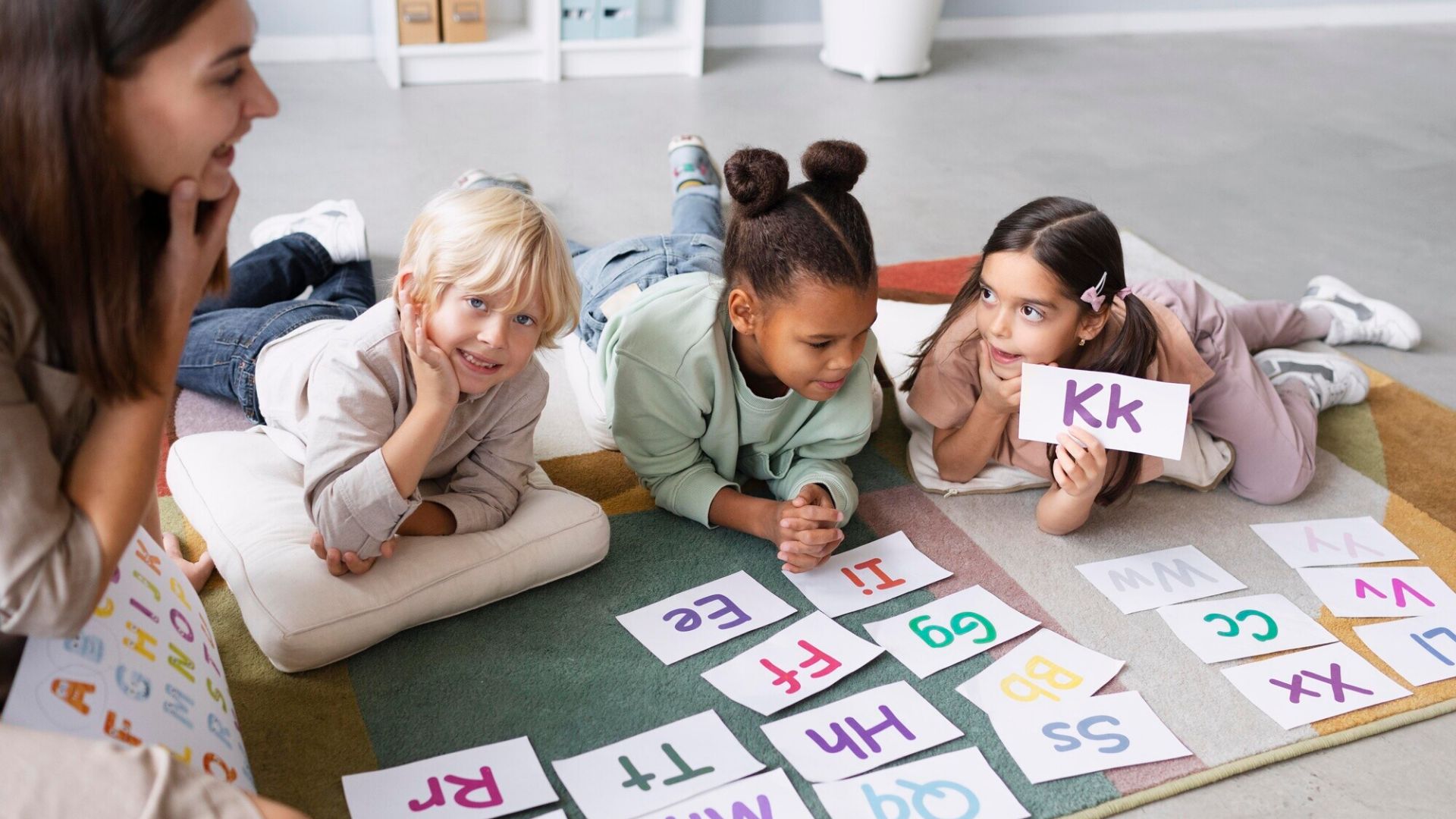
- Home
- Fun Ways to Boost Kids’ English Communication
- Priya
- 0 Comments
- February 24, 2025

Fun Ways to Boost Kids’ English Communication
Developing strong English communication skills in children is essential for their academic success and future careers. However, traditional learning methods may seem dull or overwhelming. Instead of relying solely on textbooks, engaging children in fun activities can make learning enjoyable and effective. Through games, storytelling, interactive exercises, and creative tasks, kids can improve their vocabulary, pronunciation, and confidence in speaking English. The key is to integrate learning seamlessly into their daily routine, making it feel like play rather than work. In this blog, we explore some exciting and practical ways to enhance children’s English communication skills while keeping them entertained.
Interactive Storytelling for Language Development
The Power of Narration
Storytelling is a wonderful way to improve a child’s English communication skills. When kids listen to stories, they are exposed to new words, sentence structures, and expressions. Narrating a story also helps in enhancing pronunciation and fluency. Parents and teachers can encourage children to retell a story in their own words, boosting their confidence and verbal skills. Moreover, using voice modulation and expressions makes the experience engaging and fun. This method allows children to develop a natural flow in their communication.
Role-Playing and Story Dramatization
Role-playing encourages children to step into different characters and express themselves. It is an effective way to practice sentence formation and conversational skills. Parents and teachers can organize storytelling sessions where kids act out different roles. Using props and costumes adds excitement to the activity. By pretending to be different characters, children learn to articulate thoughts clearly. This approach not only enhances vocabulary but also fosters creativity and imagination.
Encouraging Kids to Create Their Own Stories
Allowing kids to create their own stories is a great way to stimulate their imagination and language skills. Parents and teachers can provide prompts or themes to help children get started. Encouraging kids to illustrate their stories adds another layer of engagement. Writing down their stories helps in improving their written communication as well. When kids narrate their stories to others, they develop confidence in speaking and public presentation. This activity fosters creativity while reinforcing language learning.
Fun Games to Enhance English Communication
Word Association and Vocabulary Building
Word association games help children expand their vocabulary in a fun way. One such game involves saying a word, and the child must quickly say another word related to it. This game improves thinking speed and linguistic connections. Another variation is “Word Chains,” where each player adds a word starting with the last letter of the previous word. These simple yet engaging games encourage kids to think on their feet. They also enhance memory and word retention.
Charades with English Words and Phrases
Playing charades with English words helps children learn new vocabulary while having fun. In this game, a child acts out a word or phrase while others guess it. This encourages active participation and strengthens their understanding of words. Teachers and parents can use different categories, such as actions, emotions, or objects, to make it more interesting. Adding a timer increases the excitement and challenges kids to think quickly. This game helps with both comprehension and verbal expression.
Interactive Quiz and Riddle Games
Quizzes and riddles are effective in enhancing a child’s reasoning and language skills. Parents can create simple question-answer sessions where kids answer in complete sentences. Riddles stimulate critical thinking and improve understanding of word meanings. Playing these games in a group setting enhances peer interaction and communication. It also encourages kids to express their thoughts more clearly. Adding small rewards makes these games even more engaging for children.
Engaging Activities for Speaking Confidence
Daily Conversations and Real-Life Scenarios
Encouraging children to engage in daily conversations helps them build confidence in speaking English. Simple interactions, such as ordering food, asking for directions, or describing their day, strengthen their communication skills. Parents and teachers can create role-play scenarios to make these exercises more engaging. By practicing real-life conversations, children become comfortable using English in everyday situations. This method enhances their fluency and pronunciation over time.
Public Speaking and Show-and-Tell Sessions
Public speaking activities help children overcome the fear of speaking in front of others. Show-and-tell sessions allow them to describe their favorite objects or experiences in English. Parents and teachers can encourage kids to prepare short speeches on interesting topics. Practicing in front of a mirror can also help improve self-confidence. The more they practice, the more comfortable they become in expressing themselves. Gradually, children will develop a natural flow in their communication.
Singing and Rhyming Games for Pronunciation
Songs and rhymes make learning English enjoyable and interactive. Singing along to songs helps with pronunciation, rhythm, and fluency. Nursery rhymes and action songs are particularly effective for younger children. Parents can introduce tongue twisters to make learning even more fun. This helps kids practice difficult sounds and improve their speech clarity. Singing in groups also fosters teamwork and social interaction.
Technology-Based Learning for English Communication
Educational Apps and Online Games
There are many apps designed to improve kids’ English communication skills through interactive learning. Apps like Duolingo, Lingokids, and ABCmouse provide engaging exercises for vocabulary and pronunciation. These platforms use games, quizzes, and stories to make learning fun. Parents can set screen time limits to ensure balanced learning. The interactive features keep children motivated and engaged. Using technology effectively can enhance language development in an enjoyable way.
Watching English Cartoons and Shows
Watching English cartoons and educational shows helps children pick up natural speech patterns. Programs like “Peppa Pig,” “Dora the Explorer,” and “Sesame Street” incorporate language learning in a fun way. Encouraging kids to repeat phrases and dialogues enhances their listening and speaking skills. Subtitles can also help in understanding new words and phrases. This method makes learning effortless and enjoyable.
Online Storytelling and Reading Platforms
Websites and apps that offer audiobooks and interactive reading sessions are great for language improvement. Platforms like Audible, Storyberries, and Epic provide engaging stories for kids. Listening to stories read by fluent speakers helps children grasp correct pronunciation and intonation. Encouraging kids to read along improves their reading and speaking abilities. Online resources make it easier to access a variety of books and stories for continuous learning.
Encouraging a Positive Learning Environment
Creating an English-Speaking Atmosphere at Home
A language-rich environment at home plays a crucial role in developing a child’s communication skills. Parents can make English the primary mode of conversation. Labeling household items with English words helps with vocabulary reinforcement. Encouraging kids to think in English rather than translating from their native language speeds up fluency. Reading English books together strengthens language skills in a natural setting. When children are surrounded by English, they absorb the language effortlessly.
Reward-Based Learning and Encouragement
Positive reinforcement keeps children motivated to learn English. Parents and teachers can set small rewards for completing language-related activities. Sticker charts, certificates, or extra playtime work as great incentives. Praising their efforts, regardless of mistakes, builds confidence. Making learning a positive experience encourages continuous improvement. When kids feel appreciated, they are more likely to engage in language activities.
Group Activities and Peer Learning
Learning in groups helps children practice their English skills in a social setting. Encouraging kids to play language-based board games together fosters teamwork and communication. Organizing small English clubs or playdates allows children to converse naturally. Group storytelling and discussions build confidence and vocabulary. Peer learning makes the process enjoyable and reduces hesitation in speaking English.
Conclusion
Helping kids improve their English communication doesn’t have to be a tedious task. By incorporating storytelling, games, daily conversations, technology, and positive reinforcement, children can learn effortlessly. The key is to make learning fun, engaging, and interactive. A supportive environment ensures that kids develop confidence in speaking English naturally. With these creative approaches, language learning becomes an enjoyable journey rather than a challenge.
Section Title
Confidence Exercises for English Speaking Speaking English confidently can be a challenge for many...
Tips for Confident English Conversations Speaking English with confidence is essential for effective...
Overcome Fear of Speaking English Enhance your English communication skills to impress clients and...
Impress Clients with English Communication Enhance your English communication skills to impress...
Ace Job Interviews with Business English Boost your confidence and excel in job interviews with...
Negotiate Successfully in Business English Master the art of negotiation in Business English! Learn...
Network Effectively with Business English Learn to network effectively using Business English!...
Polish English for Presentations Delivering a presentation in English requires clarity, confidence...
Key Business English Phrases for Professionals Effective communication in the business world...










Leave a Comment